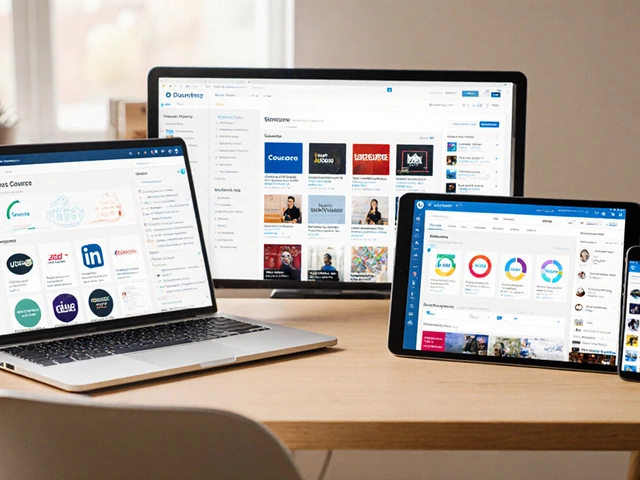
Alright, so you're thinking about getting an online degree, but there's a nagging question on your mind: Do employers really like them? It's not just you who's curious—this is a hot topic for anyone diving into online courses.
Back in the day, online degrees kind of got a bad rap. People thought they were subpar compared to the traditional route of dusty lecture halls and chalkboards. But things have changed a lot, especially after recent global events pushed education online. Now, plenty of schools offer online programs that are just as rigorous and legit as their on-campus counterparts.
So, do employers still have a bias against them? Some do, but many are catching on to the fact that online education comes with its own set of perks—like flexibility and the ability to balance work, life, and education. What's interesting is that for some fields, having an online degree might actually show you're tech-savvy and good at managing your own time, which are pretty appealing traits in today's fast-paced world.
- Changing Perceptions
- Traditional vs. Online Degrees
- Key Factors Employers Consider
- Tips to Enhance Your Online Degree
- The Future of Online Education
Changing Perceptions
Not too long ago, online degrees were seen with a bit of side-eye by employers. But guess what? That perception is doing a 180. Thanks to advances in tech and a bonafide shift towards online education (thanks, global pandemic!), many employers are starting to see them in a new light.
Think about it: A lot of major universities now offer hybrid or fully online programs. They've put in some serious work to make sure these programs meet high standards, and it shows. These programs are increasingly recognized for their quality. In fact, a 2023 survey found that around 71% of employers viewed online degrees from reputable institutions just as favorably as traditional ones.
Factors Influencing Change
Several factors are driving this shift in perception:
- Inclusion in Traditional Universities: When big names in education offer online courses, it sends a message. The course content remains fundamentally identical—only the medium changes.
- Accreditation: Accredited online programs assure employers of a standard level of education, just like in-person degrees.
- Flexibility and Adaptability: Online students often juggle multiple responsibilities. Employers are recognizing the self-discipline and time management skills required for online learning as valuable workplace traits.
So yeah, while some old-school skeptics might still be out there, the tide is turning fast. Online education isn't just the future—it's here and making its mark in the job market. It's all about showing employers that your degree, whether it's from a classroom or a computer screen, has prepared you for the real world.
Traditional vs. Online Degrees
So, we're diving into the classic showdown: traditional degrees versus online degrees. Back in the day, a degree meant sitting through hours of lectures, commuting to campus, and living the whole dorm life. Today, online degrees flip that script completely. No more stuffy classrooms or rigid schedules.
When we talk about traditional degrees, the main perk has always been the face-to-face interaction. Meeting professors and classmates in person can make it easier to network, which is a biggie when job hunting. Plus, some folks feel they're more motivated in a classroom setting.
On the flip side, online degrees offer some sweet flexibility. You can learn at your own pace, at a time that suits you. This is a win for anyone juggling work or family commitments, like many of us are. And let's be real, saving on commuting time and costs is a bonus.
Quality and Curriculum
If you're worried about the quality of education, many online courses now offer the same curriculum as their campus versions. Accredited institutions ensure that their online programs maintain high standards, which means you're learning the same stuff, without the hassle of campus life.
A study by the National Center for Education Statistics showed that online learning can sometimes yield better results. Students in online courses were found to perform better than those in traditional classes, especially when self-discipline and time management came into play. That's some food for thought!
The Value to Employers
Now, from an employer's perspective, it gets interesting. Some employers still lean towards traditional degrees, but many are starting to value the unique skills online learners bring to the table. Skills like digital literacy, self-motivation, and even resilience to distance learning aren't to be ignored. In industries like IT and tech, sometimes an online degree might even have a bit of an edge.
Pretty much, it boils down to the field you're in and how you sell your online education. If you can show that your degree is legit and the skills you've picked up are fresh and relevant, your job hunt might not be very different from someone with a traditional background.
To sum it up, both options have their perks and drawbacks. It really depends on your personal situation, career goals, and how you want to manage your learning experience. We all have different preferences, and that's what makes this digital age so exciting!

Key Factors Employers Consider
When it comes to weighing online degrees, employers aren't just looking at whether your degree came from an online course—they're diving deeper into several crucial factors. Let’s break it down.
Accreditation
This one's huge. If the school behind your online degrees is accredited, employers tend to view it more favorably. Accreditation means the program meets certain quality standards, and it's a green light for many hiring managers.
Reputation of the Institution
Big names still carry weight. If your degree is from a well-known university that's respected in your field, employers are more likely to be impressed. They may not even differentiate between on-campus or online degrees from these institutions.
Field of Study
Some fields, like IT and business, are more accepting of online degrees because these industries value skills and experience over the mode of education. Employers in these sectors often emphasize what you've accomplished in your coursework more than where you physically studied. In comparison, fields like healthcare or engineering might be more hesitant unless the online degree includes extensive practical components.
Skills and Experiences
Experiences are where you can shine, folks. Employers love candidates who can demonstrate real-world skills. So, if your online courses included projects, internships, or certifications, highlight these on your resume. They show you didn’t just learn passively but actively applied your knowledge.
Soft Skills Acquisition
Online education often requires strong time management, self-motivation, and digital communication skills. Employers appreciate these soft skills, viewing them as indicators of your ability to thrive in a modern workplace.
In sum, when you're polishing your applications, don't just list your online degrees. Build a narrative around your practical skills, experiences, and the caliber of your institution. This way, you present a well-rounded picture that appeals positively to your potential employers.
Tips to Enhance Your Online Degree
So, you've taken the plunge into online education, or you're about to. Awesome choice! But how do you make sure your online degree stands out and gets the nod from employers? Well, here are some solid tips to help you along the way.
Choose a Reputable Program
First things first, pick an accredited program from a university that has a solid reputation. Accreditation is key—it means your degree meets the necessary academic standards. Plus, it's something employers look for.
Leverage Networking Opportunities
Even in the online world, networking counts. Engage with your peers, professors, and industry professionals. Many online programs offer virtual networking events or alumni meet-ups. Jump on these chances to build relationships that could lead to job opportunities.
Showcase Your Skills
An online degree teaches you more than just textbook knowledge. You're developing time management, digital communication, and self-discipline skills. Highlight these when you’re applying for jobs—they're what modern workplaces crave.
Gather Practical Experience
Theory is great, but hands-on experience can give you a huge edge. Look for internships, freelance gigs, or volunteer work in your field. Sometimes online programs even offer virtual internships. It’s all about showing employers you can apply what you've learned.
Utilize Career Services
Don’t forget about the career services your school offers. Many have online resume workshops, interview prep sessions, and job boards. These resources can help you transition from student to employee smoothly.
Personalize Your Learning Experience
- Take additional courses to specialize in niche areas and make your resume shine.
- Engage in webinars or online workshops to stay updated with industry trends.
- Participate in student forums and discussions to enhance collaborative skills.
Remember, the goal is to use your online degree as a launchpad for your career. With these tips, you're sure to catch the eye of employers and land that dream job.

The Future of Online Education
When we think about online degrees and education, it's hard not to wonder where it's headed. With tech evolving at lightning speed, education is certainly getting a makeover, and online learning is at the heart of it. So, let's dig into what's coming.
The Shift Towards Digital
The transition from traditional to digital classrooms is not slowing down. More universities are not only offering but also expanding their online programs. With tools like virtual reality becoming mainstream, learning could become an immersive experience rather than just clicking through slides.
Consider this: by 2030, it's predicted that around 50% of students will be pursuing at least one of their courses online. That's huge! It's driven by factors like affordability, flexibility, and the sheer ease of access.
Employer Acceptance
Many employers initially saw online degrees as second-tier, but opinions are changing. Today, what matters is the skills you bring to the table, not just where you learned them. Strong online programs now focus on building competencies that are immediately applicable in the workplace.
Some companies even partner with online platforms to create education programs tailored to their needs, further blurring the lines between traditional and online education.
Emerging Trends
- Micro-credentials: Short, focused courses that offer specialized knowledge and skills. They appeal to employers looking for specific expertise.
- AI-Driven Learning: With AI, courses can be customized to fit students' learning styles, pacing, and interests. This could revolutionize how students engage with content.
- Global Classrooms: Online education connects students from all over the world, which brings diverse perspectives into the learning environment.
As online courses evolve, they'll likely become more interactive and student-centric, meeting the demands of tomorrow's workforce.
The bottom line? Online education isn't just a fad; it's a significant part of the future. It’s breaking down barriers and making education accessible to more people than ever before. Whether you're considering an online degree now or are just curious, it's a trend that's here to stay—and it’s shaping the job market right along with it.





